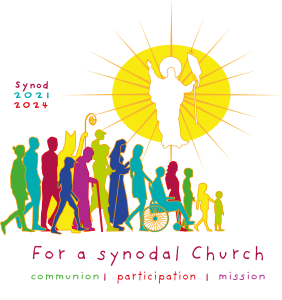
Synodality: Communion. Participation. Mission.
Synodality is a constitutive dimension of the Church. (12) It is an essential element or fundamental aspect of what it means to be Church, something that cannot be removed without changing the very nature of the Church itself.
What is synodality? Orientated towards mission, synodality involves gathering at all levels of the Church for mutual listening (the exercise of deep and respectful listening to one another), dialogue, and community discernment. Ecclesial discernment (discernment within the Church – (arch)dioceses, parishes, Families of Parishes) is not an organizational technique but rather a spiritual practice grounded in a living faith. (82)
It also involves reaching consensus as an expression of Christ rendering himself present, He who is alive in the Spirit. Furthermore, it consists in reaching decisions according to a differentiated understanding of co-responsibility. (28) Synodality is the walking together of Christians with Christ and towards God’s kingdom, in union with all humanity.
The three pillars of a Synodal Church are communion, participation, and mission. The Church is not merely a club, a group, a business, or any other purely human community, precisely because the Holy Spirit animates the Church. (Acts 2) (Timothy Gabrielli, PhD)
Why is synodality important? While “synodality” may be an unfamiliar term for many, the concept is rooted in Sacred Scripture, Church teaching, and longstanding archdiocesan practice. Leaders in parishes and Families of Parishes (pastors, staff, councils, ministries) are called to grow in communion with Christ and one another, praying together, listening to one another, seeking and discerning God’s will in making decisions and shaping parish life now and for the future.
The Vademecum and the Final Document for the Synod on Synodality establish fundamental understanding of synodality. The quotes above and excerpts cited in the links below are particularly pertinent to parish and Family leadership.
